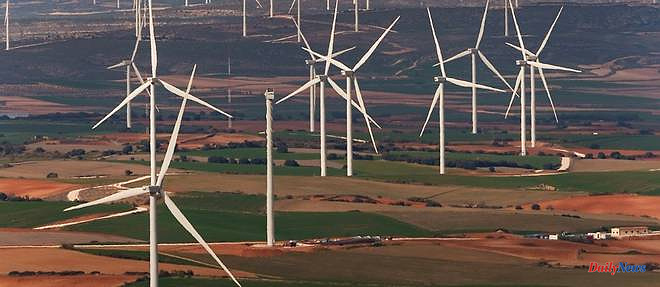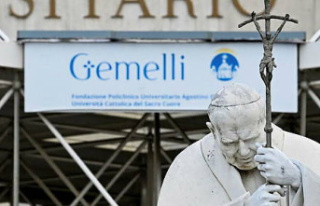The States of the European Union and MEPs agreed on Thursday to almost double the share of renewables in energy consumption by 2030, a key component of the ambitious European climate plan.
The text consecrates biomass (wood burned to produce energy) as "green", to the chagrin of environmental NGOs worried about the impact on forests, and takes into account the role of nuclear power to produce carbon-free hydrogen. , bone of contention between the Twenty-Seven.
The deal, reached after a night of final talks, sets a binding target of at least 42.5% renewable energy in European consumption by 2030, a near doubling of the current level of around 22 % (19% in France). It comes with an "indicative" target level of 45% that states will strive to achieve.
"Renewables will contribute to our energy sovereignty by reducing fossil imports" and will reduce bills, welcomed Frans Timmermans, Vice-President of the Commission.
The NGO European Environmental Bureau, however, regretted a "low and exceeded" objective, while "the modeled scenarios show that 50% is possible and recommended to respect the Paris Agreement".
In fact, the EU is already on the right path.
After doubling since 2004, the share of renewables is, "under current conditions", on the way to reaching 45% by 2030, or even 50% "in the event of increased support", estimated at the end of February the cabinet Ember, noting in particular the exponential growth of solar energy.
The text speeds up authorization procedures, with the establishment of "dedicated areas" where national authorities will be required to approve new renewable energy installations within a maximum of 18 months (period limited to 27 months outside).
The EU plans 49% renewables in building energy consumption, with a gradual greening trajectory for heating and cooling.
In transport, States must by 2030 either reduce the intensity of greenhouse gases by 14.5% thanks to renewables, or reach 29% of renewables in the final energy consumption of the sector.
A binding target is set for the use of "advanced biofuels" (derived from non-food materials) or "non-biological renewable fuels" (hydrogen, synthetic fuels).
Industrialists will have to increase their use of renewables by 1.6% per year. In each country, the share of renewable hydrogen in the hydrogen used by industry must reach 42% by 2030.
However, the Swedish EU presidency, which was negotiating on behalf of the states, obtained a relaxation of the target for countries with a nuclear fleet that can produce decarbonized hydrogen.
The question tore the Twenty-Seven: France and its allies demanded equal treatment between renewable hydrogen and "low carbon"? a red line for several countries (Germany, Austria, Luxembourg, Spain...), which refused to encourage nuclear power in a text devoted to green energies at the risk of slowing down investment in renewables.
Finally, the agreement reached provides that the 2030 target for renewable hydrogen may be reduced by 20% for States where the "fossil" share in hydrogen consumption is less than 23%.
"France will not be obliged to build renewables to make hydrogen for industry and transport, but will be able to use nuclear power", which is granted "a specific status, neither green nor fossil", observes the MEP Pascal Canfin (Renew, centrists).
What satisfy both Paris and countries refusing any formal equivalence between atom and green energies.
“This agreement enshrines recognition of the role of nuclear power in achieving our decarbonization objectives, an important step forward in principle,” welcomed French Minister Agnès Pannier-Runacher.
This flexibility will apply provided that the country meets its mandatory contribution to the overall objective of 42.5% of renewables in the EU, insists MEP Markus Pieper (EPP, right), rapporteur for the text.
-Biomass-
The agreement maintains the "renewable" status of bioenergy, but reinforces the "sustainability" criteria for biomass, the sources of which will be prioritized according to their "economic and environmental added value". Certain forest areas will be excluded, public aid more restricted.
Fiercely defended by the Scandinavian countries, the practice is denounced by ecologists while already burning half of the wood harvest in Europe to produce energy.
This law "will reward energy companies burning millions of trees, our main terrestrial carbon sink, worsening the climate and biodiversity crisis, and undermining people's health", indignantly Martin Pigeon, of the NGO Fern.
30/03/2023 16:08:58 - Bruxelles (AFP) - © 2023 AFP












